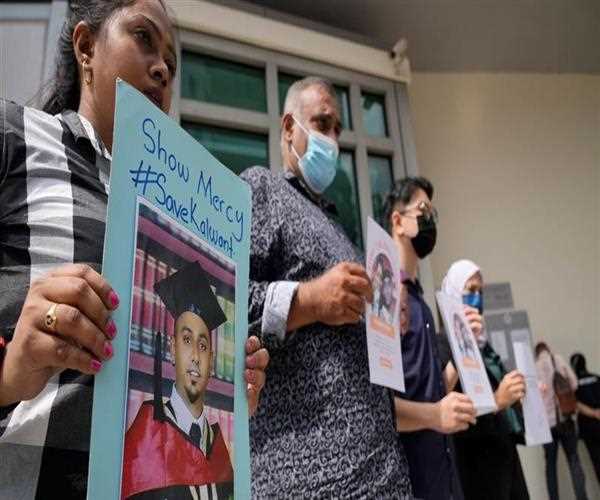
11-Jul-2022
Singapore executes two Singaporean Drug Traffickers despite pleas for mercy
Two men were hanged in Singapore on Thursday for drug trafficking, despite cries for mercy from activists for human rights who worry about 'a new wave' of hangings in the Asian city-state infamous for its drug policies.
The Singapore Prison Service informed via email that the death sentences of Malaysian Kalwant Singh, 31, and Singaporean Norasharee bin Gous, 48, were carried out on Thursday at Changi Prison Complex.
Their executions, which take the total number of death sentences carried out by the nation this year to four, came just two months after Singapore controversially executed a man with an intellectual disability for drug trafficking.
Thursday's hanging of the two drug traffickers brought the total number of hangings this year in the city-state to four, despite mounting calls for the death penalty to be abolished.
Authorities in Singapore said on Tuesday that Norasharee and Singh, who were both found guilty of narcotics trafficking and given the mandatory death sentence, had exhausted all of their legal challenges.
Both individuals had spent the previous six years on execution row while several clemency campaigns were being launched. According to a statement released earlier this week by Amnesty International Malaysia, the two hangings 'appear to be part of a new wave' in Singapore.
The Central Narcotics Bureau reports that both men received death sentences in June 2016. Norasharee was found guilty of encouraging a man to traffic 120.9 grams of heroin, while Singh had been found guilty of both possessing and trafficking 60.15 grams (2.1 ounces) of the substance.
The Misuse of Drugs Act in Singapore stipulates that trafficking a particular amount of drugs, such as 15 grams (0.5 ounces) of heroin, leads to an automatic death sentence. However, the law has recently been revised to allow a guilty individual to avoid the death penalty under certain conditions.
Activists claimed that following the executions of Norasharee Gous and Kalwant Singh on Thursday morning, the prison administration gave their relatives their possessions and death certificates.
The executions, according to Amnesty International, Human Rights Watch, and other organizations opposed to the death sentence, were a flagrant violation of international human rights standards.
According to Amnesty, Singapore is one of just four nations that has executed individuals for drug-related offenses in recent years, defying a global trend to halt the death penalty.
'The death penalty is never a solution, and we are always against it. There is little proof that it serves as a particularly effective deterrent to crime, according to Emerlynne Gil, deputy regional director for research at Amnesty International.
Gil said in a statement: 'We encourage the Singaporean authorities to immediately put an end to this most recent round of hangings and institute a moratorium on executions as a first step toward removing this cruel and inhumane punishment.
The 2016 heroin importation conviction of Kalwant made him the second Malaysian to be executed in less than three months. Due to his alleged mental impairment, the hanging of another Malaysian in late April caused a global outcry.
On the eve of his death, Kalwant filed a last-minute appeal arguing that he was only a courier and had cooperated with authorities, but it was dismissed by Singapore's top court, according to campaigners.
The death penalty in Singapore, according to critics, has mostly been used to catch low-level mules and has had little effect on drug traffickers and organized syndicates. Singapore's government, however, argues that it was required to safeguard its residents and claims that all those who were executed received a complete due process review.
Four further drug dealers, two of whom were Malaysian citizens, were due to be executed earlier, but their executions were postponed while legal objections were being pursued.
Human Rights Watch echoed calls for Singapore to commute the sentences of individuals who are on death row and stop carrying out executions for any drug-related offenses.
According to its deputy Asia director, Phil Robertson, 'recent drug busts in the country reveal just how hollow Singapore's assertions about the alleged deterrence effect of these horrific executions are.' 'The countries taking part in the burgeoning international movement to abolition the death penalty should denounce Singapore's obstinate actions and insist that all executions cease.'
Nagaenthran K. Dharmalingam, a 34-year-old Malaysian citizen, was executed in Singapore in April in a case that sparked international outrage because doctors determined he had an IQ of 69 and was mentally retarded.
Dharmalingam was detained in 2009 for selling 42.7 grams (1.5 ounces) of heroin. He was later found guilty and given a death sentence in 2010.
Dharmalingan's attorneys said he shouldn't have been given a death sentence since he was unable to grasp what he was doing, but Singapore's courts repeatedly rejected their requests to have the execution of Dharmalingan quashed.
Human rights activists argued that the mandatory death penalty for drug trafficking is a harsh punishment, which brought the city-zero-tolerance state's drug legislation back under investigation.

Student
current post-graduate student at christ university and an aspiring content writer with experience in working on online content creation and research..
Join Our Newsletter
Subscribe to our newsletter to receive emails about new views posts, releases and updates.
Copyright 2010 - 2026 MindStick Software Pvt. Ltd. All Rights Reserved Privacy Policy | Terms & Conditions | Cookie Policy